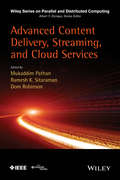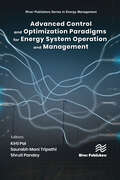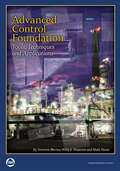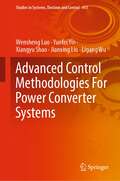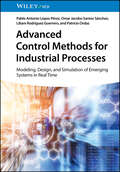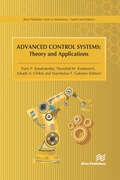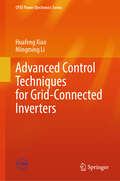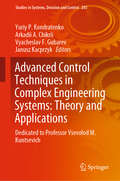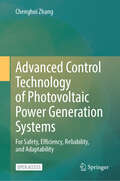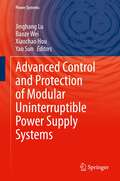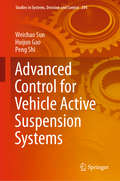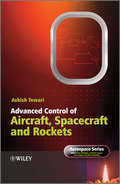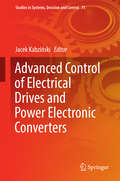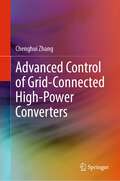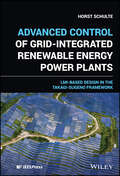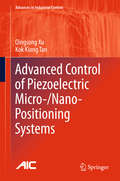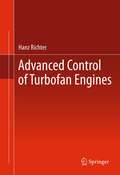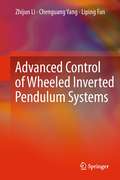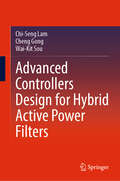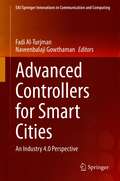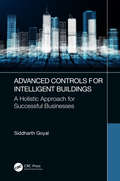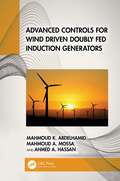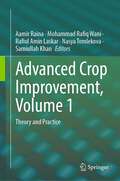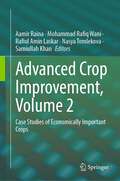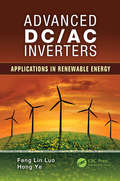- Table View
- List View
Advanced Content Delivery, Streaming, and Cloud Services
by Mukaddim Pathan Dom Robinson Ramesh K. SitaramanAs the subject area of CDN gains research interest and momentum, it is crucial to stay up-to-date with recent developments of its evolutionary track, as well as the current landscape and roadmap. This book provides performance models, case studies, business analyses, and several other important components, so practicing engineers and academics can use the text as a timely reference.* Provides an in-depth look at Cloud-based CDNs* Includes CDN and streaming media basics and tutorials* Aimed to instruct systems architects, practitioners, product developers, and researchers* Material is divided into introductory subjects, advanced content, and specialist areas
Advanced Control & Optimization Paradigms for Energy System Operation and Management
by Kirti Pal Saurabh Mani Tripathi Shruti PandeyDistributed energy technologies are gaining popularity nowadays; however, due to the highly intermittent characteristics of distributed energy resources, a larger penetration of these resources into the distribution grid network becomes of major concern. The main issue is to cope with the intermittent nature of the renewable sources alongside the requirements for power quality and system stability. Unlike traditional power systems, the control and optimization of complex energy systems comprising of wind, solar, thermal, and energy storage becomes difficult in many aspects, such as modelling, integration, operation, coordination and planning etc. This means that energy conversion as per the standards imposed by the energy market is unachievable without adequate control, management, and optimization.This edited book serves as a resource for the engineers, scientists and professionals working on distributed energy systems. The book is an extensive collection of state-of-the-art studies on advanced control paradigms for complex energy systems, with emphasis on the optimization and management of the high penetration of distributed energy resources into power distribution networks. Readers will find the book inspiring and useful whilst carrying out their own research in distributed energy systems.Key features • An extensive collection of state-of-the-art studies on advanced control paradigms for complex energy systems.• Emphasis on the optimization and management of high penetration of distributed energy resources into power/energy distribution networks.• Serves as a valuable resource for engineers, scientists, academicians, experienced professionals, and research scholars who are working in management of energy systems.
Advanced Control Foundation: Tools, Techniques and Applications
by Terrence Blevins Mark Nixon Willy K. WojsznisIn this book, the authors address the concepts and terminology that are needed to apply advanced control techniques in the process industry. The book is written for the process or control engineer that is familiar with traditional control but has little or no experience in designing, installing, commissioning and maintaining advanced control applications. Each chapter of the book is structured to allow a person to quickly understand the technology and how it is applied. Application examples are used to show what is required to address an application. Also, a section of each chapter is dedicated to a more in-depth discussion of the technology for the reader that is interested in understanding the mathematical basis for the technology. A workshop is provided at the end of each chapter that explores the technology. The reader may view the workshop solution by going to the web site that accompanies the book. The book provides comprehensive coverage of the major advanced control techniques that are most commonly used in the process industry. This includes tools for monitoring control system performance, on-demand and adaptive tuning techniques, model predictive control, LP optimization, data analytics for batch and continuous processes, fuzzy logic control, neural networks and advancements in PID to use with wireless measurements. Since many readers may work with an existing DCS that does not support advanced control, a chapter of the book is dedicated to tools and techniques that the authors have found useful in integrating advanced control tools into an existing control system. Also, one chapter of the book addresses how dynamic process simulations may be easily created in a DCS to support checkout and operator training on the use of advanced control.
Advanced Control Methodologies For Power Converter Systems (Studies in Systems, Decision and Control #413)
by Ligang Wu Jianxing Liu Yunfei Yin Wensheng Luo Xiangyu ShaoThis book aims to present some advanced control methodologies for power converters. Power electronic converters have become indispensable devices for plenty of industrial applications over the last decades. Composed by controllable power switches, they can be controlled by effective strategies to achieve desirable transient response and steady-state performance, to ensure the stability, reliability and safety of the system. The most popular control strategy of power converters is the linear proportional–integral–derivative series control which is adopted as industry standard. However, when there exist parameter changes, nonlinearities and load disturbances in the system, the performance of the controller will be significantly degraded. To overcome this problem, many advanced control methodologies and techniques have been developed to improve the converter performance. This book presents the research work on some advanced control methodologies for several types of power converters, including three-phase two-level AC/DC power converter, three-phase NPC AC/DC power converter, and DC/DC buck converter. The effectiveness and advantage of the proposed control strategies are verified via simulations and experiments. The content of this book can be divided into two parts. The first part focuses on disturbance observer-based control methods for power converters under investigation. The second part investigates intelligent control methods. These methodologies provide a framework for controller design, observer design, stability and performance analysis for the considered power converter systems.
Advanced Control Methods for Industrial Processes: Modeling, Design, and Simulation of Emerging Systems in Real Time
by Pablo A. López-Pérez Omar Jacobo Santos Sánchez Liliam Rodríguez Guerrero Patricio OrdazA detailed introduction to mathematical models for new and established control engineers Control engineering is a system that helps us understand electrical, physical, chemical, and biochemical systems through the use of mathematical modeling, using inputs, outputs, and simulations. These experimental platforms are implemented in most systems of modern advanced control engineering. Advanced Control Methods for Industrial Processes provides a solid grounding in traditional control techniques. It emphasizes practical application methods alongside the underlying theory and core instrumentation. Each chapter discusses the full profile of the technology covered, from the field layer and control layer to its implementation. It also includes the interfaces for advanced control systems: between controllers and systems theory, between different layers, and between operators-systems. Through an emphasis on the practical issues of components, devices, and hardware circuits, the book offers working principles and operation mechanisms that allow an engineer to put theory into practice for the advanced control techniques. Advanced Control Methods for Industrial Processes readers will also find: A practical overview on advanced control methods applied to real-time and in-silico systems Specific parameters, install procedures, calibration and configuration methodologies necessary to conduct the relevant models Clear insights into the necessary mathematical models Tutorial material to facilitate the understanding of core concepts Advanced Control Methods for Industrial Processes is an ideal companion for process engineers, control engineers, and chemists in industry.
Advanced Control Systems: Theory and Applications (Studies In Systems, Decision And Control Ser. #203)
by Yuriy P. Kondratenko Arkadii A. Chikrii Vyacheslav F. Gubarev Vsevolod M. KuntsevichAdvanced Control Systems: Theory and Applications provides an overview of advanced research lines in control systems as well as in design, development and implementation methodologies for perspective control systems and their components in different areas of industrial and special applications.It consists of extended versions of the selected papers presented at the XXV International Conference on Automatic Control “Automatics 2018” (September 18-19, 2018, Lviv, Ukraine) which is the main Ukrainian Control Conference organized by Ukrainian Association on Automatic Control (National member organization of IFAC) and Lviv National University “Lvivska Politechnica”. More than 100 papers were presented at the conference with topics including: mathematical problems of control, optimization and game theory; control and identification under uncertainty; automated control of technical, technological and biotechnical objects; controlling the aerospace craft, marine vessels and other moving objects; intelligent control and information processing; mechatronics and robotics; information measuring technologies in automation; automation and IT training of personnel; the Internet of things and the latest technologies.The book is divided into two main parts, the first concerning theory (7 chapters) and the second concerning applications (7 chapters) of advanced control systems. The first part “Advances in Theoretical Research on Automatic Control” consists of theoretical research results which deal with descriptor control impulsive delay systems, motion control in condition of conflict, inverse dynamic models, invariant relations in optimal control, robust adaptive control, bio-inspired algorithms, optimization of fuzzy control systems, and extremal routing problem with constraints and complicated cost functions. The second part “Advances in Control Systems Applications” is based on the chapters which consider different aspects of practical implementation of advanced control systems, in particular, special cases in determining the spacecraft position and attitude using computer vision system, the spacecraft orientation by information from a system of stellar sensors, control synthesis of rotational and spatial spacecraft motion at approaching stage of docking, intelligent algorithms for the automation of complex biotechnical objects, an automatic control system for the slow pyrolysis of organic substances with variable composition, simulation complex of hierarchical systems based on the foresight and cognitive modelling, and advanced identification of impulse processes in cognitive maps.The chapters have been structured to provide an easy-to-follow introduction to the topics that are addressed, including the most relevant references, so that anyone interested in this field can get started in the area. This book may be useful for researchers and students who are interesting in advanced control systems.
Advanced Control Techniques for Grid-Connected Inverters (CPSS Power Electronics Series)
by Huafeng Xiao Mingming LiThis book introduces planning method of power control configuration and structuring method of signal process link for grid-connected power conversion. These methods can be used for readers in research and engineering fields of renewable energy system. In this way, readers wishing to learn these control methods can gain insight on how to design and practice each control method easily. Readership: Graduate students and academics majored in power electronics, and engineers engaged in developing grid-connected inverters for renewable energy system; senior undergraduate students majored in electrical engineering and automation engineering.
Advanced Control Techniques in Complex Engineering Systems: Dedicated to Professor Vsevolod M. Kuntsevich (Studies in Systems, Decision and Control #203)
by Janusz Kacprzyk Yuriy P. Kondratenko Arkadii A. Chikrii Vyacheslav F. GubarevThis book presents an authoritative collection of contributions by researchers from 16 different countries (Austria, Chile, Georgia, Germany, Mexico, Norway, P.R. of China, Poland, North Macedonia, Romania, Russia, Spain, Turkey, Ukraine, the United Kingdom and United States) that report on recent developments and new directions in advanced control systems, together with new theoretical findings, industrial applications and case studies on complex engineering systems. This book is dedicated to Professor Vsevolod Mykhailovych Kuntsevich, an Academician of the National Academy of Sciences of Ukraine, and President of the National Committee of the Ukrainian Association on Automatic Control, in recognition of his pioneering works, his great scientific and scholarly achievements, and his years of service to many scientific and professional communities, notably those involved in automation, cybernetics, control, management and, more specifically, the fundamentals and applications of tools and techniques for dealing with uncertain information, robustness, non-linearity, extremal systems, discrete control systems, adaptive control systems and others. Covering essential theories, methods and new challenges in control systems design, the book is not only a timely reference guide but also a source of new ideas and inspirations for graduate students and researchers alike. Its 15 chapters are grouped into four sections: (a) fundamental theoretical issues in complex engineering systems, (b) artificial intelligence and soft computing for control and decision-making systems, (c) advanced control techniques for industrial and collaborative automation, and (d) modern applications for management and information processing in complex systems. All chapters are intended to provide an easy-to-follow introduction to the topics addressed, including the most relevant references. At the same time, they reflect various aspects of the latest research work being conducted around the world and, therefore, provide information on the state of the art.
Advanced Control Technology of Photovoltaic Power Generation Systems: For Safety, Efficiency, Reliability, and Adaptability
by Chenghui ZhangThe photovoltaic (PV) inverter serves as the interface between the PV panels and the power grid and realizes the power conversion, which is the core equipment of the PV power generation system. With the development of PV industry, the requirements of functions or performances for PV inverters are also gradually proposed in practical applications, which consist of safety, generation efficiency, transmitted power quality, robustness to multiple disturbances, grid-friendly, continuity of power supply, and system reliability. To satisfy these requirements, this book puts forward a series of software-based advanced control technologies for PV inverters. Through these control technologies, the PV power generation system has gradually become a system with high safety, high reliability, high efficiency, and strong adaptability, which serves as a core support in modern power system. To facilitate the understanding, the operating principle, model derivation, control schemes, and comprehensive verification results of the PV inverters are presented step by step in this book, which can serve as a guide for electrical engineers and researchers involved in the development of PV power generation. This is an open access book.
Advanced Control and Protection of Modular Uninterruptible Power Supply Systems (Power Systems)
by Yao Sun Xiaochao Hou Jinghang Lu Baoze WeiThis book provides an in-depth introduction to all major control and stability issues related to microgrids. It is the first book to offer a comprehensive look into the methodologies and philosophies behind system modeling, coordinated control, and protection for developing reliable, robust, and efficient operation of modular uninterruptible power supply systems. For each topic, a theoretical introduction and overview are backed by concrete programming examples that enable the reader to thoroughly understand the topic and develop and conduct simulation models.
Advanced Control for Vehicle Active Suspension Systems (Studies in Systems, Decision and Control #204)
by Huijun Gao Peng Shi Weichao SunThis book focuses on most recent theoretical findings on control issues for active suspension systems. The authors first introduce the theoretical background of active suspension control, then present constrained H∞ control approaches of active suspension systems in the entire frequency domain, focusing on the state feedback and dynamic output feedback controller in the finite frequency domain which people are most sensitive to. The book also contains nonlinear constrained tracking control via terminal sliding-mode control and adaptive robust theory, presenting controller design of active suspensions as well as the reliability control of active suspension systems. The target audience primarily comprises research experts in control theory, but the book may also be beneficial for graduate students alike.
Advanced Control of Aircraft, Spacecraft and Rockets
by Ashish TewariAdvanced Control of Aircraft, Spacecraft and Rockets introduces the reader to the concepts of modern control theory applied to the design and analysis of general flight control systems in a concise and mathematically rigorous style. It presents a comprehensive treatment of both atmospheric and space flight control systems including aircraft, rockets (missiles and launch vehicles), entry vehicles and spacecraft (both orbital and attitude control). The broad coverage of topics emphasizes the synergies among the various flight control systems and attempts to show their evolution from the same set of physical principles as well as their design and analysis by similar mathematical tools. In addition, this book presents state-of-art control system design methods - including multivariable, optimal, robust, digital and nonlinear strategies - as applied to modern flight control systems.Advanced Control of Aircraft, Spacecraft and Rockets features worked examples and problems at the end of each chapter as well as a number of MATLAB / Simulink examples housed on an accompanying website at http://home.iitk.ac.in/~ashtew that are realistic and representative of the state-of-the-art in flight control.
Advanced Control of Electrical Drives and Power Electronic Converters (Studies in Systems, Decision and Control #75)
by Jacek KabzińskiThis contributed volume is written by key specialists working in multidisciplinary fields in electrical engineering, linking control theory, power electronics, artificial neural networks, embedded controllers and signal processing. The authors of each chapter report the state of the art of the various topics addressed and present results of their own research, laboratory experiments and successful applications. The presented solutions concentrate on three main areas of interest: · motion control in complex electromechanical systems, including sensorless control; · fault diagnosis and fault tolerant control of electric drives; · new control algorithms for power electronics converters. The chapters and the complete book possess strong monograph attributes. Important practical and theoretical problems are deeply and accurately presented on the background of an exhaustive state-of the art review. Many results are completely new and were never published before. Well-known control methods like field oriented control (FOC) or direct torque control (DTC) are referred as a starting point for modifications or are used for comparison. Among numerous control theories used to solve particular problems are: nonlinear control, robust control, adaptive control, Lyapunov techniques, observer design, model predictive control, neural control, sliding mode control, signal filtration and processing, fault diagnosis, and fault tolerant control.
Advanced Control of Grid-Connected High-Power Converters
by Chenghui ZhangThe high-power grid-connected converters play a vital role in modern power system, realizing the conversion and transmission of electrical energy, and determining its safety, stability and efficiency. This book explores the advanced control strategies of high-power grid-connected converter to satisfy the high-power requirements in practical applications. Special attention is given to grid-connected converter modules in parallel operation to overcome the challenges of non-ideal power grid, power switches faults, and circulating current. Through the advanced control strategies presented in this book, the power capacity of grid-connected converter is flexibly increased with high-reliability and efficiency, thus expanding the application range of high-power converters in modern power system. To facilitate understanding, this book provides step-by-step model derivation and controller design for grid-connected converter. Meanwhile, it also provides the comprehensive simulation and experimental results to offer readers a deep insight into the control process of grid-connected converters. This book serves as a guide for electrical engineers and researchers involved in the development of high-power converters.
Advanced Control of Grid-Integrated Renewable Energy Power Plants: LMI-based Design in the Takagi-Sugeno Framework (IEEE Press)
by Horst SchultePresents the principles, derivations, and equations of renewable energy power plants, including MATLAB code Advanced Control of Grid-Integrated Renewable Energy Power Plants presents a comprehensive introduction to the power system dynamics and stability of renewable energy power plants (RPPs), such as wind turbines, wind power plants, and photovoltaic systems. The author—a noted expert on the topic—takes a rigorous approach to the analysis and modelling of RPPs, such as turbine rotors, PV cells, electronic converters, transformers, and aggregated grid models. This approach allows for the validation of requirements for sustainable power systems based on formal methods. The text deals with nonlinear model-based observer and control design techniques in the Takagi-Sugeno (TS) framework. It explores the Takagi-Sugeno fuzzy (TSF) models which are nonlinear systems, in which the consequent part of a fuzzy rule is a mathematical formula, representing local dynamics or limited nonlinearities by sector functions. The strong property of the TSF finds several applications modelling dynamical systems that can be described by differential equations. The book’s practical exercises use MATLAB code to help model simulation models of single large-scale wind turbines, wind farms, and photovoltaic plants. This important book: Provides a complete introduction to the power system dynamics and stability of renewable energy power plants Includes a detailed discussion of how to design model model-based controllers for RPPs Takes a rigorous approach to the analysis and modelling of RPPs, including turbine rotors, PV cells, electronic converters, transformers, aggregated grid models, and more Includes MATLAB code to model simulation models of single large-scale wind turbines, wind farms, and photovoltaic plants Written for students and researchers of renewable energy, Advanced Control of Grid-Integrated Renewable Energy Power Plants offers an authoritative text to the topic.
Advanced Control of Piezoelectric Micro-/Nano-Positioning Systems (Advances in Industrial Control)
by Kok Kiong Tan Qingsong XuThis book explores emerging methods and algorithms that enable precise control of micro-/nano-positioning systems. The text describes three control strategies: hysteresis-model-based feedforward control and hysteresis-model-free feedback control based on and free from state observation. Each paradigm receives dedicated attention within a particular part of the text. Readers are shown how to design, validate and apply a variety of new control approaches in micromanipulation: hysteresis modelling, discrete-time sliding-mode control and model-reference adaptive control. Experimental results are provided throughout and build up to a detailed treatment of practical applications in the fourth part of the book. The applications focus on control of piezoelectric grippers. Advanced Control of Piezoelectric Micro-/Nano-Positioning Systems will assist academic researchers and practising control and mechatronics engineers interested in suppressing sources of nonlinearity such as hysteresis and drift when combining position and force control of precision systems with piezoelectric actuation.
Advanced Control of Turbofan Engines
by Hanz RichterAdvanced Control of Turbofan Engines describes the operational performance requirements of turbofan (commercial) engines from a controls systems perspective, covering industry-standard methods and research-edge advances. This book allows the reader to design controllers and produce realistic simulations using public-domain software like CMAPSS: Commercial Modular Aero-Propulsion System Simulation, whose versions are released to the public by NASA. The scope of the book is centered on the design of thrust controllers for both steady flight and transient maneuvers. Classical control theory is not dwelled on, but instead an introduction to general undergraduate control techniques is provided. Advanced Control of Turbofan Engines is ideal for graduate students doing research in aircraft engine control and non-aerospace oriented control engineers who need an introduction to the field.
Advanced Control of Wheeled Inverted Pendulum Systems
by Chenguang Yang Zhijun Li Liping FanAdvanced Control of Wheeled Inverted Pendulum Systems is an orderly presentation of recent ideas for overcoming the complications inherent in the control of wheeled inverted pendulum (WIP) systems, in the presence of uncertain dynamics, nonholonomic kinematic constraints as well as underactuated configurations. The text leads the reader in a theoretical exploration of problems in kinematics, dynamics modeling, advanced control design techniques and trajectory generation for WIPs. An important concern is how to deal with various uncertainties associated with the nominal model, WIPs being characterized by unstable balance and unmodelled dynamics and being subject to time-varying external disturbances for which accurate models are hard to come by. The book is self-contained, supplying the reader with everything from mathematical preliminaries and the basic Lagrange-Euler-based derivation of dynamics equations to various advanced motion control and force control approaches as well as trajectory generation method. Although primarily intended for researchers in robotic control, Advanced Control of Wheeled Inverted Pendulum Systems will also be useful reading for graduate students studying nonlinear systems more generally.
Advanced Controllers Design for Hybrid Active Power Filters
by Chi-Seng Lam Cheng Gong Wai-Kit SouThe book focuses on different advanced current control strategies of LC-coupling hybrid active power filter (LC-HAPF) and Thyristor controlled LC-coupling hybrid active power filter (TCLC-HAPF). Both topologies and their corresponding advanced current control strategies are introduced, with more weight placed on the current control strategies. A total of 9 advanced current control strategies are studied in details for both LC-HAPF and TCLC-HAPF. The comprehensive and systematic treatment of advanced current controller design is one of the major features of the book, which is particularly suitable for readers who are interested in learning the design and implementation of current controller design for HAPFs. The book can benefit researchers, engineers, undergraduate and postgraduate students in the fields of electrical and electronic engineering, power electronics, control strategy, etc.
Advanced Controllers for Smart Cities: An Industry 4.0 Perspective (EAI/Springer Innovations in Communication and Computing)
by Fadi Al-Turjman Naveenbalaji GowthamanThis book provides basic knowledge of advanced microcontrollers associated with large systems and devices. The book determines the feasibility of the advanced controllers from an Industry 4.0 perspective, which is associated with Integrated Internet of Things (IIoT) when developing larger smart cities. Also, it describes potential applications, key areas of Industry 4.0, and controlling applications with microcontrollers. Chapters include IoT with integrated control applications in smart city paradigm; agriculture, public safety, women and child care & welfare; healthcare, water management, government and administration; environmental impact, energy with management of information systems; and safety, education, transportation systems with advanced controllers.
Advanced Controls for Intelligent Buildings: A Holistic Approach for Successful Businesses
by Siddharth GoyalThis book focuses primarily on both technical and business aspects needed to select, design, develop and deploy control application (or product) successfully for multiple components in building systems. Designing and deploying a control application require multiple steps such as sensing, system dynamics modelling, algorithms, and testing. This may involve choosing an appropriate methodology and technique at multiple stages during the development process. Understanding the pros and cons of such techniques, most importantly being aware of practically possible approaches in the entire ecosystem, is critical in choosing the best framework and system application for different parts of building systems. Providing a wide overview of the state-of art in controls and building systems, providing guidance on developing an end-to-end system in relation to business fundamentals (distribution channels, stakeholders, marketing, supply-chain and financial management), the book is ideal for fourth-year control/mechanical/electrical engineering undergraduates, graduate students, and practitioners including business leaders concerned with smart building technology.
Advanced Controls for Wind Driven Doubly Fed Induction Generators
by Mahmoud K. Abdelhamid Mahmoud A. Mossa Ahmed A. HassanAdvanced Controls for Wind Driven Doubly Fed Induction Generators discusses the most advanced control algorithms used for enhancing the dynamics of a doubly fed induction generator (DFIG) operating at fixed and variable speeds, and which are used for different utilization purposes (standalone and grid connection). Extensive generator performance analysis has been introduced using various control topologies. Features: Presents modeling of wind energy conversion systems (WECS), including a wind turbine as a prime mover, a DFIG as a generation unit for electrical energy, and a three-phase induction motor as an isolated load Explores a detailed description for the presented control algorithms in order to visualize the base principle of each method Introduces a comprehensive performance analysis for the DFIG using the formulated predictive voltage control scheme and other control techniques under different operating conditions Examines the formulation of new control approaches which overcome the shortages present in previous DFIG control schemes Presents a detailed comparison between different control topologies for the DFIG to outline the most effective procedure in terms of dynamic response, structure simplicity, ripples, total harmonic distortion, and computational burdens The book is written for researchers and academics working on advanced control systems and those interested in areas such as machine drives, renewable energy systems, 'adaptive control', modeling of WECS, and optimization theory.
Advanced Crop Improvement, Volume 1: Theory and Practice
by Aamir Raina Mohammad Rafiq Wani Rafiul Amin Laskar Nasya Tomlekova Samiullah KhanAs per the reports of FAO, the human population will rise to 9 billion by the end of 2050 and 70% of more food must be produced over the next three decades to feed the additional population. The breeding approaches for crop improvement programs are dependent on the availability and accessibility of genetic variation, either spontaneous or induced by the mutagens. Plant breeders, agronomists, and geneticists are under constant pressure to expand food production by employing innovative breeding strategies to enhance yield, adaptability, nutrition, resistance to biotic and abiotic stresses. In conventional breeding approaches, introgression of genes in crop varieties is laborious and time-consuming. Nowadays, new innovative plant breeding techniques such as molecular breeding and plant biotechnology, supplement the traditional breeding approaches to achieve the desired goals of enhanced food production. With the advent of recent molecular tools like genomics, transgenics, molecular marker-assisted back-crossing, TILLING, Eco-TILLING, gene editing, CRISPR CAS, non-targeted protein abundant comparative proteomics, genome wide association studies have made possible mapping of important QTLs, insertion of transgenes, reduction of linkage drags, and manipulation of genome. In general, conventional and modern plant breeding approaches would be strategically ideal for developing new elite crop varieties to meet the feeding requirement of the increasing world population.This book highlights the latest progress in the field of plant breeding, and their applicability in crop improvement. The basic concept of this 2-volume work is to assess the use of modern breeding strategies in supplementing conventional breeding toward the development of elite crop varieties, for obtaining desired goals of food production.
Advanced Crop Improvement, Volume 2: Case Studies of Economically Important Crops
by Aamir Raina Mohammad Rafiq Wani Rafiul Amin Laskar Nasya Tomlekova Samiullah KhanAs per the reports of FAO, the human population will rise to 9 billion by the end of 2050 and 70% of more food must be produced over the next three decades to feed the additional population. The breeding approaches for crop improvement programs are dependent on the availability and accessibility of genetic variation, either spontaneous or induced by the mutagens. Plant breeders, agronomists, and geneticists are under constant pressure to expand food production by employing innovative breeding strategies to enhance yield, adaptability, nutrition, resistance to biotic and abiotic stresses. In conventional breeding approaches, introgression of genes in crop varieties is laborious and time-consuming. Nowadays, new innovative plant breeding techniques such as molecular breeding and plant biotechnology, supplement the traditional breeding approaches to achieve the desired goals of enhanced food production. With the advent of recent molecular tools like genomics, transgenics, molecular marker-assisted back-crossing, TILLING, Eco-TILLING, gene editing, CRISPR CAS, non-targeted protein abundant comparative proteomics, genome wide association studies have made possible mapping of important QTLs, insertion of transgenes, reduction of linkage drags, and manipulation of genome. In general, conventional and modern plant breeding approaches would be strategically ideal for developing new elite crop varieties to meet the feeding requirement of the increasing world population.This book highlights the latest progress in the field of plant breeding, and their applicability in crop improvement. The basic concept of this 2-volume work is to assess the use of modern breeding strategies in supplementing the conventional breeding toward the development of elite crop varieties, for obtaining desired goals of food production.
Advanced DC/AC Inverters: Applications in Renewable Energy (Power Electronics, Electrical Engineering, Energy, and Nanotechnology)
by Fang Lin Luo Hong YeDC/AC inversion technology is of vital importance for industrial applications, including electrical vehicles and renewable energy systems, which require a large number of inverters. In recent years, inversion technology has developed rapidly, with new topologies improving the power factor and increasing power efficiency. Proposing many novel approaches, Advanced DC/AC Inverters: Applications in Renewable Energy describes advanced DC/AC inverters that can be used for renewable energy systems. The book introduces more than 100 topologies of advanced inverters originally developed by the authors, including more than 50 new circuits. It also discusses recently published cutting-edge topologies. Novel PWM and Multilevel Inverters The book first covers traditional pulse-width-modulation (PWM) inverters before moving on to new quasi-impedance source inverters and soft-switching PWM inverters. It then examines multilevel DC/AC inverters, which have overcome the drawbacks of PWM inverters and provide greater scope for industrial applications. The authors propose four novel multilevel inverters: laddered multilevel inverters, super-lift modulated inverters, switched-capacitor inverters, and switched-inductor inverters. With simple structures and fewer components, these inverters are well suited for renewable energy systems. Get the Best Switching Angles for Any Multilevel Inverter A key topic for multilevel inverters is the need to manage the switching angles to obtain the lowest total harmonic distortion (THD). The authors outline four methods for finding the best switching angles and use simulation waveforms to verify the design. The optimum switching angles for multilevel DC/AC inverters are also listed in tables for quick reference. Application Examples of DC/AC Inverters in Renewable Energy Systems Highlighting the importance of inverters in improving energy saving and power-supply quality, the final chapter of the book supplies design examples for applications in wind turbine and solar panel energy systems. Written by pioneers in advanced conversion and inversion technology, this book guides readers in designing more effective DC/AC inverters for use in renewable energy systems.
